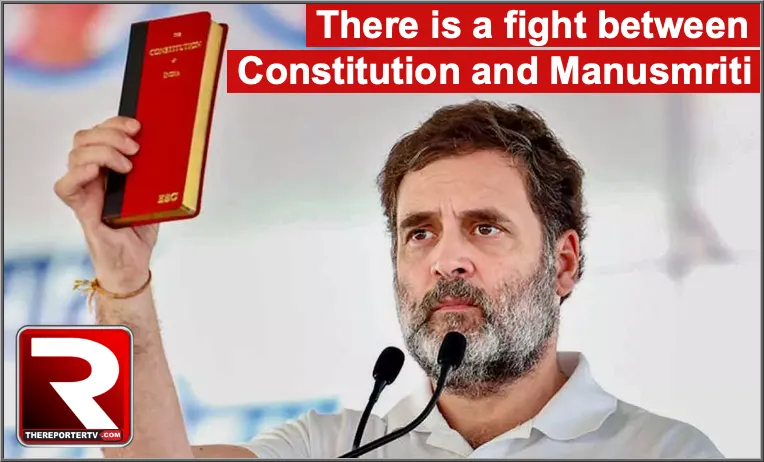Ranchi, Oct 19 — Rahul Gandhi, Leader of Opposition in the Lok Sabha, delivered a powerful critique of the Manusmriti during his address at the ‘Samvidhan Samman Sammelan’ held in Ranchi on Saturday. He described the ancient text as fundamentally anti-constitutional, highlighting a long-standing ideological conflict between the principles of the Constitution and the Manusmriti.
In his speech, Gandhi emphasized that while India’s Constitution was formally drafted in 1949-1950, its foundational philosophy is deeply rooted in the teachings of historical figures such as Lord Buddha, Guru Nanak, Baba Saheb Ambedkar, Birsa Munda, Narayana Guru, and Basavanna. He asserted, “Without the influence of these great leaders, the Constitution might not have come into existence. Today, however, that progressive thinking is under siege,” stressing the urgent need to protect the Constitution.
Gandhi did not hold back in his criticism of the Central government, accusing Prime Minister Narendra Modi and Home Minister Amit Shah, along with other officials, of systematically undermining the Constitution. He warned, “Their goal is to weaken and destroy it, but we will not let that happen.”
Addressing social inequality, the Congress leader reiterated his party’s commitment to conducting a caste census. He argued that such a measure is essential to address the disproportionate power held by the top 1% of the population over the remaining 90%. Gandhi voiced concerns about the erasure of history for marginalized communities and affirmed that the caste census would be conducted at any cost, alongside a call to lift the 50% cap on reservations.
Gandhi further criticized the education system for its lack of representation of tribal and backward communities. Reflecting on his own educational experiences, he noted the absence of substantial content related to the history and contributions of Dalits, OBCs, and farmers. “Dalits are only mentioned in one line about untouchability,” he lamented.
The former Congress president also highlighted the exclusionary practices within the country’s bureaucratic structure, pointing out that Dalits, tribals, and backward classes are severely underrepresented in key ministries. He illustrated this disparity by stating that if Rs 100 is allocated for spending, Dalit officers control only Re 1, and tribal officers even less.
Gandhi further called attention to the lack of representation of marginalized communities in various sectors, including media, corporate leadership, and the judiciary. He accused the government of deliberately excluding these groups from power and opportunities, criticizing the BJP’s characterization of tribals as “Vanvasis” (forest dwellers) as an attempt to marginalize them further. “Tribals were the original inhabitants of this land,” he asserted, claiming they have the primary right to its resources.
In a pointed critique, Gandhi accused the BJP of sidelining President Droupadi Murmu from significant national events, such as the inauguration of Parliament and the Ram temple, due to her tribal background.
He concluded by alleging that the BJP has seized control over vital institutions, including the media, Election Commission, CBI, ED, Income Tax, and the bureaucracy, further jeopardizing the democratic fabric of the nation.


